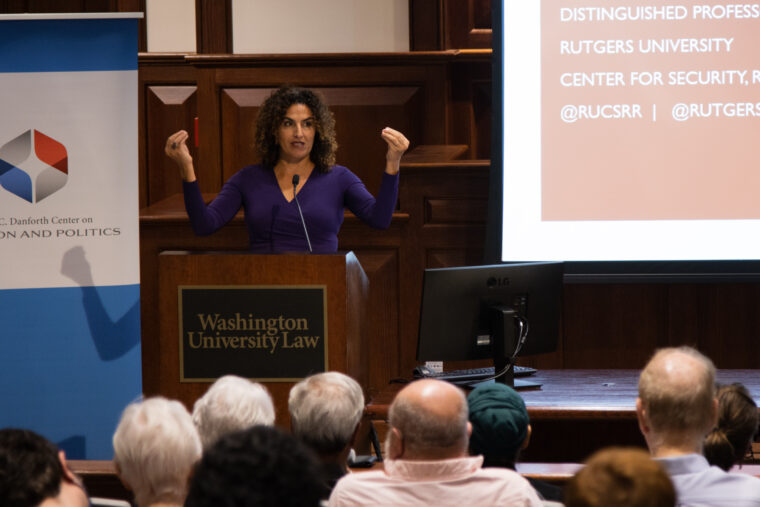News
Professor Sahar Aziz delivers lecture on how racialization of the Israel-Hamas war is causing Islamophobia

Professor Sahar Aziz lectures about the impact of racialization and free speech in relation to the Israel-Hamas War (Anna Calvo | Student Life)
Professor Sahar Aziz delivered a lecture and answered audience questions about the racialization of the Israel-Hamas war, particularly by political parties in the United States. The event, titled “The Palestine Taboo: Race, Islamophobia, and Free Speech,” was the first John C. Danforth Center on Religion and Politics event of the year. Sept. 23.
Professor of Religion and Politics Mark Valeri from the Danforth Center introduced Aziz, who is a distinguished Professor of Law at Rutgers University Law School and the founding director of the Rutgers Center for Security, Race, and Rights. She specializes in unequal applications of freedom of speech and religious protections, specifically on college campuses and in American public life.
More than 100 students and faculty attended the event. In her speech, Aziz unpacked the dangers of racialization, highlighted the threats facing free speech, and emphasized the power of collective action as a form of education.
Aziz stressed that students can use the Israel-Hamas war protests and their participation in them as a learning experience and way to experience collective action firsthand.
“You all are so lucky to be experiencing this hardship, because it’s the best education,” Aziz said. “We could never teach you this in the classroom. You can read about the Civil Rights Movement, but you’re living the Civil Rights Movement.”
She started her lecture by dissecting racialization, which is the process where certain groups of people, religious or otherwise, come to be designated as being a part of a particular race. She focused especially on Palestinian and Muslim experiences after Oct. 7.
“When this is your lived experience, you face the harsh reality that whatever you have accomplished educationally, professionally or economically fades into the background, overshadowed by one dominant narrative, [that] all Muslims, Arabs and Palestinians are violent, disloyal and hateful,” Aziz said.
She pointed out that racialization can lead to the assigning of collective guilt to innocent members of a certain minority group.
“In a society that claims to value individual responsibility, members of racialized groups are mistreated, defamed and punished for the bad deeds of others, who have nothing to do with them except having the same religious identity,” Aziz said.
Aziz added that Muslims are not the first religious group to experience this kind of racialization and discussed similarities between present day Islamophobia in the United States and mid-20th century antisemitism.
In regards to the ongoing Israel-Hamas war, Aziz emphasized how politicians, whether conservative or liberal, weaponize Islamophobic and antisemitic rhetoric to keep Jewish and Muslim communities in fear of each other for their own political gain.
“The Islamophobic racial trope that Muslims hate Jews is being maliciously peddled by Republican politicians punching down at Palestinian students … while Democratic politicians cowardly remain silent,” Aziz said.
Additionally, Aziz criticized the way the media has portrayed the war in Gaza and accused “Zionist pro-Israeli organizations,” such as the Anti-Defamation League, of perpetuating Islamophobia by sending leaders at 200 universities a letter demanding that they investigate students involved in the pro-Palestine movement on the basis of supporting Hamas.
In her view, only groups who are in the majority can have their free speech rights protected and escape this treatment of fear-mongering and ostracization.
This theme of asymmetric application of free speech rights, especially to Arabs and Muslims after Oct. 7, was central to Aziz’s lecture. She outlined a “zero-sum frame,” in which Arabs and Muslims cannot criticize Israel’s actions in any way without being labeled as antisemitic.
“Whatever free speech rights we as Muslims or Arabs or Palestinian Americans may have on paper are blithely dismissed and disregarded in practice,” Aziz said. “Professors, students, school teachers and private citizens are finding themselves targets of orchestrated smear campaigns, doxxing, harassment, and termination from their jobs by self-described Zionist organizations.”
In the Q&A part of the talk, Aziz was asked about how to disentangle support for Jewish Americans with support for Israel.
“As an Egyptian American, I just don’t feel qualified to answer the question … but I would just say don’t fall into the trap of conflating a nation-state with a religious community,” Aziz said.
Ambar De Santos is a junior who has been active in organizing for the pro-Palestine movement at WashU. She came to the event to get a reminder of the goals she has been organizing for.
“Especially as someone who is not Palestinian, I do find value and so much reason to fight for Palestinian justice and against this horrible genocide that is happening,” De Santos said. “I wanted to hear someone who was so well educated express the ideas that I definitely believe in.”
Junior Samira Saleh, who is Palestinian, said that she attended the event mostly because of her identity.
“Outside of keeping myself informed and accountable on my perspective and experience on campus, I have found these events as a great opportunity to connect with faculty who have shown support for students in my position,” Saleh said.
Saleh also said that she appreciated how Professor Aziz acknowledged her own positionality and how it influenced her opinions on these issues.
Valeri, who asked Aziz the audience questions, explained to Student Life why she was chosen to be the first Religion and Politics lecturer of the semester.
“We wanted to continue a conversation that had begun last spring about the Israel-Gaza issue and we wanted to do it in an intellectually respectable way,” Valeri said.
Graduate student John Naughton felt that the event was an important conversation about race, religion, and the Israel-Hamas war.
“I think that one of the main takeaways for me was how central race is to informing our understanding of and our reaction to the genocide going on in Gaza and campus protests here and around the country,” Naughton said.
